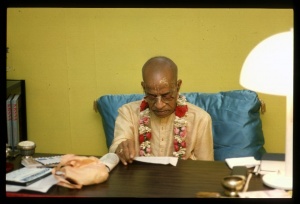SB 1.14.41: Difference between revisions
m (1 revision(s)) |
No edit summary |
||
| Line 1: | Line 1: | ||
{{info | {{info | ||
|speaker=King | |speaker=King Yudhiṣṭhira | ||
|listener=Arjuna | |listener=Arjuna | ||
}} | }} | ||
[[Category:Srimad-Bhagavatam - Canto 01 Chapter 14]] | |||
[[Category:Bhagavatam Verses Spoken by Yudhisthira Maharaja - Vanisource|011441]] | |||
<div style="float:left">'''[[Srimad-Bhagavatam]] - [[SB 1|First Canto]] - [[SB 1.14: The Disappearance of Lord Krsna|Chapter 14: The Disappearance of Lord Kṛṣṇa]]'''</div> | |||
<div style="float:right">[[File:Go-previous.png|link=SB 1.14.40]] '''[[SB 1.14.40]] - [[SB 1.14.42]]''' [[File:Go-next.png|link=SB 1.14.42]]</div> | |||
{{CompareVersions|SB|1.14.41|SB 1965|SB 1972-77}} | |||
{{RandomImage}} | |||
==== TEXT 41 ==== | ==== TEXT 41 ==== | ||
<div class="verse"> | |||
<div | :kaccit tvaṁ brāhmaṇaṁ bālaṁ | ||
kaccit tvaṁ brāhmaṇaṁ bālaṁ | :gāṁ vṛddhaṁ rogiṇaṁ striyam | ||
gāṁ vṛddhaṁ rogiṇaṁ striyam | :śaraṇopasṛtaṁ sattvaṁ | ||
śaraṇopasṛtaṁ sattvaṁ | :nātyākṣīḥ śaraṇa-pradaḥ | ||
nātyākṣīḥ śaraṇa-pradaḥ | |||
</div> | </div> | ||
| Line 18: | Line 23: | ||
==== SYNONYMS ==== | ==== SYNONYMS ==== | ||
<div class="synonyms"> | |||
<div | ''kaccit''—whether; ''tvam''—yourself; ''brāhmaṇam''—the ''brāhmaṇas''; ''bālam''—the child; ''gām''—the cow; ''vṛddham''—old; ''rogiṇam''—the diseased; ''striyam''—the woman; ''śaraṇa-upasṛtam''—having approached for protection; ''sattvam''—any living being; ''na''—whether; ''atyākṣīḥ''—not given shelter; ''śaraṇa-pradaḥ''—deserving protection. | ||
</div> | </div> | ||
| Line 26: | Line 30: | ||
==== TRANSLATION ==== | ==== TRANSLATION ==== | ||
<div class="translation"> | |||
<div | |||
You are always the protector of the deserving living beings, such as brāhmaṇas, children, cows, women and the diseased. Could you not give them protection when they approached you for shelter? | You are always the protector of the deserving living beings, such as brāhmaṇas, children, cows, women and the diseased. Could you not give them protection when they approached you for shelter? | ||
</div> | </div> | ||
| Line 34: | Line 37: | ||
==== PURPORT ==== | ==== PURPORT ==== | ||
<div class="purport"> | |||
The ''brāhmaṇas'', who are always engaged in researching knowledge for the society's welfare work, both materially and spiritually, deserve the protection of the king in all respects. Similarly, the children of the state, the cow, the diseased person, the woman and the old man specifically require the protection of the state or a ''kṣatriya'' king. If such living beings do not get protection by the ''kṣatriya'', or the royal order, or by the state, it is certainly shameful for the ''kṣatriya'' or the state. If such things had actually happened to Arjuna, Mahārāja Yudhiṣṭhira was anxious to know about these discrepancies. | |||
</div> | |||
<div | |||
<div style="float:right; clear:both;">[[File:Go-previous.png|link=SB 1.14.40]] '''[[SB 1.14.40]] - [[SB 1.14.42]]''' [[File:Go-next.png|link=SB 1.14.42]]</div> | |||
</div> | __NOTOC__ | ||
__NOTOC__ | __NOEDITSECTION__ | ||
Revision as of 04:57, 2 May 2021

A.C. Bhaktivedanta Swami Prabhupada
TEXT 41
- kaccit tvaṁ brāhmaṇaṁ bālaṁ
- gāṁ vṛddhaṁ rogiṇaṁ striyam
- śaraṇopasṛtaṁ sattvaṁ
- nātyākṣīḥ śaraṇa-pradaḥ
SYNONYMS
kaccit—whether; tvam—yourself; brāhmaṇam—the brāhmaṇas; bālam—the child; gām—the cow; vṛddham—old; rogiṇam—the diseased; striyam—the woman; śaraṇa-upasṛtam—having approached for protection; sattvam—any living being; na—whether; atyākṣīḥ—not given shelter; śaraṇa-pradaḥ—deserving protection.
TRANSLATION
You are always the protector of the deserving living beings, such as brāhmaṇas, children, cows, women and the diseased. Could you not give them protection when they approached you for shelter?
PURPORT
The brāhmaṇas, who are always engaged in researching knowledge for the society's welfare work, both materially and spiritually, deserve the protection of the king in all respects. Similarly, the children of the state, the cow, the diseased person, the woman and the old man specifically require the protection of the state or a kṣatriya king. If such living beings do not get protection by the kṣatriya, or the royal order, or by the state, it is certainly shameful for the kṣatriya or the state. If such things had actually happened to Arjuna, Mahārāja Yudhiṣṭhira was anxious to know about these discrepancies.